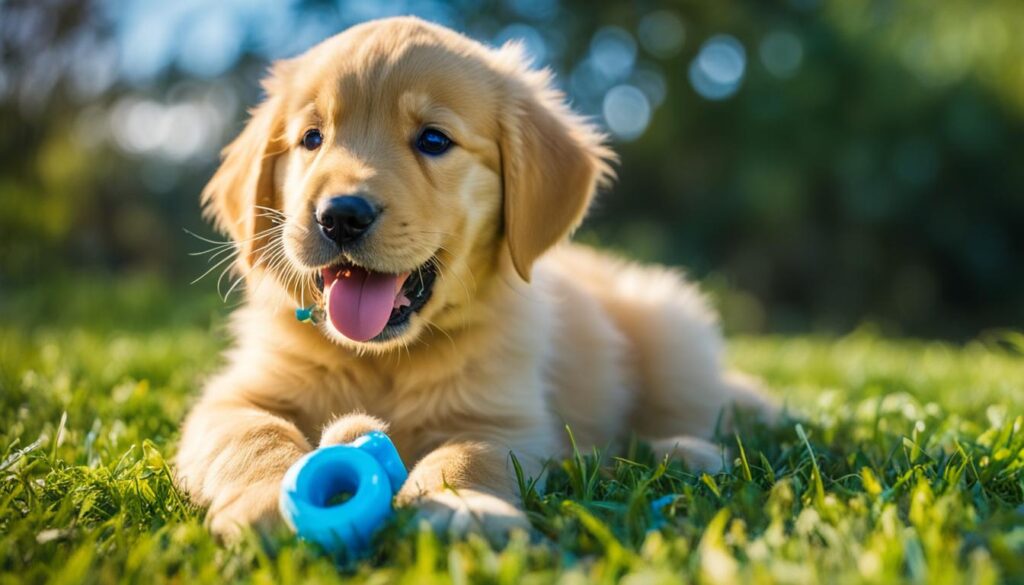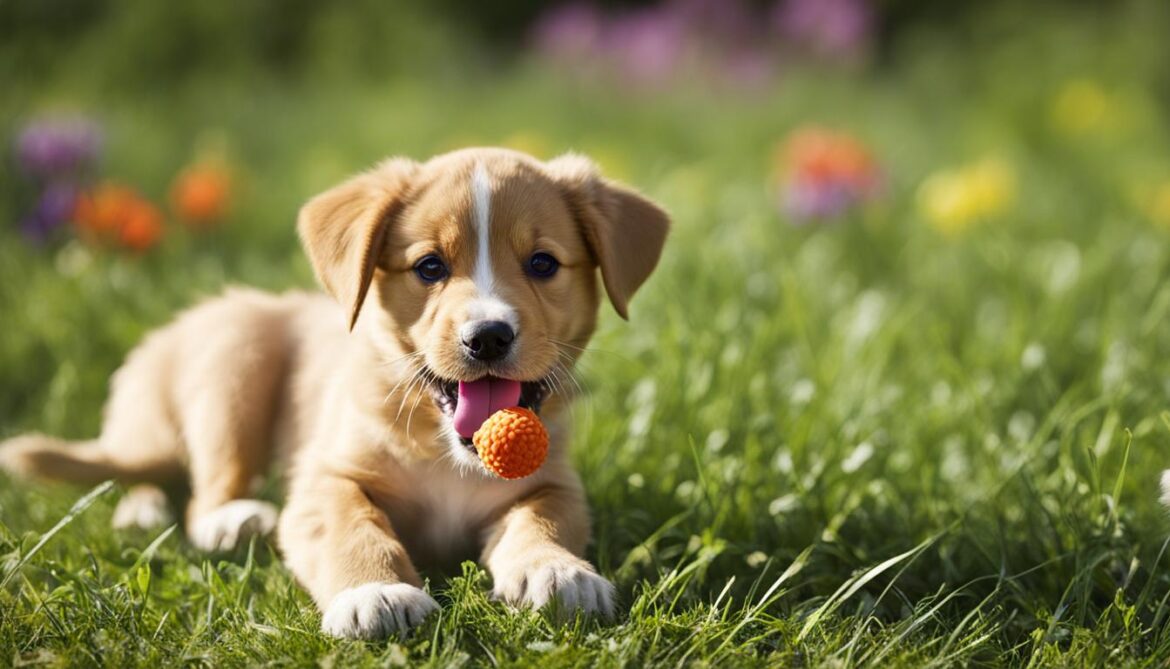If you’re a new puppy owner, you may be wondering when do puppies lose their baby teeth. Understanding the timeline of puppy teething is essential for providing proper dental care and ensuring your puppy’s dental development is on track.
Puppies typically start losing their baby teeth between 12 and 16 weeks old, with the process usually complete by the time they are six months old. During this time, their adult teeth will start to emerge, and their baby teeth will naturally fall out to make room for them.
It’s important to note that every puppy is different, and some may start or finish teething a bit earlier or later than others. Regular visits to your veterinarian can help you keep track of your puppy’s dental development and ensure any potential issues are addressed promptly.
Proper dental care during this critical time is essential to supporting your puppy’s oral health. Without proper care, puppies can develop dental issues that can impact their overall health as they grow into adults.
Key Takeaways:
- Puppies typically start losing their baby teeth between 12 and 16 weeks old.
- The process of puppy teething is usually complete by the time they are six months old.
- Regular veterinary visits can help you monitor your puppy’s dental development.
- Proper dental care is essential for supporting your puppy’s oral health.
- Untreated dental issues can impact your puppy’s overall health as an adult.
Stages of Puppy Teething
It’s important to understand the various stages of puppy teething, from the emergence of their first baby teeth to the shedding of these teeth to make way for their adult teeth. This process can take anywhere from three to eight months, with small breed puppies typically experiencing teething faster than their larger counterparts.
Stage 1: 2-4 Weeks
During stage one, puppies will begin to develop their baby teeth or “milk teeth.” These teeth are not visible yet, but you may notice your puppy chewing on objects or licking their gums more frequently than usual. At this stage, it’s crucial to make sure your puppy has access to chew toys and other safe items to help alleviate teething discomfort.
Stage 2: 3-4 Weeks
Between three and four weeks old, puppies’ baby teeth will start to emerge. These teeth are extremely sharp and can be painful if your puppy accidentally nips you. It’s essential to continue providing safe chew toys during this stage.
Stage 3: 12 Weeks
At around 12 weeks old, puppies will have all of their baby teeth. During this stage, your puppy’s teeth will be fully visible, and they will likely be more interested in exploring their world through their mouth. Be sure to keep unsafe items out of reach, and continue to provide safe chew toys.
Stage 4: 16 Weeks
At around 16 weeks old, puppies’ baby teeth will begin to fall out, making way for their adult teeth. This process can take several weeks, with the puppy losing one or two teeth at a time. You may notice your puppy chewing more frequently during this stage, but it’s crucial to monitor their behavior to ensure they are not chewing on unsafe items.
Stage 5: 6-8 Months
By six to eight months old, puppies should have all of their adult teeth. During this stage, it’s crucial to continue providing good dental care, including regular brushing and vet check-ups. This will help to ensure your puppy’s teeth stay healthy and strong for years to come.
To help you visualize these stages, take a look at the puppy teething timeline table below:
| Age | Teething Stage | What’s Happening |
|---|---|---|
| 2-4 Weeks | Stage 1 | Baby teeth start to develop |
| 3-4 Weeks | Stage 2 | First baby teeth emerge |
| 12 Weeks | Stage 3 | All baby teeth are visible |
| 16 Weeks | Stage 4 | Baby teeth begin to fall out |
| 6-8 Months | Stage 5 | All adult teeth are present |
As you can see, the stages of puppy teething are essential to understand to ensure your furry friend’s dental health. Next, we’ll explore the signs that your puppy is going through the teething process in section 3.
Signs of Puppy Teething
Watching your puppy go through the teething process can be a source of concern and discomfort. Fortunately, there are ways to identify the signs that your puppy is going through this process. Some common symptoms of teething in puppies include:
- Excessive chewing on objects
- Drooling
- Loss of appetite
- Swollen or red gums
- Bleeding gums
- Whining or crying
- Bad breath
If you notice any of these symptoms, your puppy may be going through the teething process. In most cases, these symptoms will resolve on their own. However, you can help ease your puppy’s discomfort by offering them chew toys or frozen washcloths to soothe their sore gums.
It’s important to note that teething in puppies usually occurs in stages. Different teeth will emerge and shed at different times, which means that your puppy may experience discomfort at various stages of the process. Understanding the puppy teething stages can help you anticipate your puppy’s needs and provide appropriate support.

“The teething process can be a challenging time for both you and your puppy. However, by being aware of the signs and symptoms of teething, you can help your puppy through this process and ensure their oral health and overall well-being.”
Puppy Dental Care
Proper dental care for your puppy is essential to ensure their overall health and well-being. Neglecting their dental health can lead to serious problems such as gum disease, tooth decay, and even heart disease. By establishing good dental care habits early on, you can prevent these issues and help your puppy maintain healthy teeth and gums.
Here are some tips for puppy dental care:
- Brush your puppy’s teeth daily with a soft-bristled toothbrush and puppy toothpaste. Start gradually and make it a positive experience by using rewards and praise.
- Provide appropriate chew toys to help clean their teeth and massage their gums.
- Take your puppy for regular veterinary checkups, including dental exams and cleanings.
It’s important to note that human toothpaste should never be used on puppies as it can be harmful to their health. Additionally, avoid giving your puppy hard bones or toys that may damage their teeth.
To promote good puppy oral hygiene, consider adding dental treats or chews to their diet. These can help reduce plaque and tartar buildup while also providing a tasty treat that your puppy will love.
Overall, taking care of your puppy’s dental health can help prevent future dental problems and ensure that they live a happy, healthy life.
Transition to Adult Teeth
As your puppy grows, their baby teeth will eventually make way for their adult teeth. But when do puppies get adult teeth? Typically, around 3 to 4 months of age, puppies begin to lose their deciduous teeth and their permanent teeth start to grow in.
During this transition, you may notice your puppy experiencing discomfort and exhibiting certain behaviors, such as excessive chewing or drooling. It’s essential to provide your puppy with appropriate chew toys and regular dental care to alleviate any discomfort and promote healthy dental development.

It’s important to note that the timeline for tooth loss and adult tooth emergence can vary between individual puppies. Some may lose their baby teeth faster or slower than average, and the process can continue into the fifth or sixth month of life.
As your puppy’s adult teeth emerge, it’s crucial to continue practicing good dental care habits. This includes regular brushing, appropriate chew toys, and seeking veterinary care if you notice any concerning issues such as difficulty eating or excessive bleeding.
By closely monitoring your puppy’s dental development and providing proper care, you can ensure a healthy and happy smile for years to come.
Puppy Tooth Loss
As your puppy grows, their baby teeth will begin to fall out and be replaced by adult teeth. This process, known as puppy tooth loss, typically begins around three to four months of age and can last until they are about six months old.
During this time, your puppy may experience some discomfort or pain as their teeth loosen and fall out. You may notice them chewing more frequently, drooling excessively, or even refusing to eat. It’s important to provide them with appropriate chew toys to help alleviate their discomfort and prevent them from chewing on inappropriate items, like furniture or shoes.
Puppy Tooth Loss Stages
The process of puppy tooth loss typically occurs in stages, with the incisors being the first to go around three to four months of age. The canines and premolars usually follow suit around four to five months, and the molars typically fall out last at around five to six months of age.
It’s important to note that this timeline can vary from puppy to puppy, and some may lose their teeth earlier or later than others.
Losing Puppy Teeth
When your puppy starts losing their baby teeth, you may notice small, white teeth around your home. This is normal and nothing to be concerned about. However, if you notice bleeding or excessive pain, it’s important to consult with your veterinarian to rule out any underlying issues.
You should also continue to provide proper dental care during this time, such as regular brushing and vet check-ups, to ensure that your puppy’s oral health remains in good condition.
Baby Teeth in Puppies
Just like human babies, puppies are born with baby teeth that are eventually replaced by adult teeth. These baby teeth, also known as deciduous teeth, are important for your puppy’s early development and allow them to chew and eat solid foods.
It’s important to keep in mind that while your puppy’s baby teeth may not last forever, they still require proper care and attention. Neglecting their dental care during this time can lead to long-term issues with their adult teeth.
Conclusion
Congratulations on making it to the end of this article! By now, you should have a good understanding of when puppies lose their baby teeth, the stages of puppy teething, and the importance of puppy dental care. Remember that a healthy set of teeth is crucial to your puppy’s overall health and well-being, so make sure to follow the tips outlined in this article to keep your puppy’s teeth in tip-top shape.
If you notice any issues or concerns during your puppy’s teething journey, don’t hesitate to consult your veterinarian. They can provide personalized guidance and advice to ensure your puppy stays healthy and happy.
Thank you for taking the time to read this article. We hope you found it informative and helpful in navigating the world of puppy teething.
FAQ
When do puppies lose their baby teeth?
Puppies typically start losing their baby teeth around 3-6 months of age. The process can continue until they are about 7 months old.
What are the stages of puppy teething?
The stages of puppy teething include the emergence of baby teeth, the shedding of these teeth, and the development of adult teeth. The timeline can vary, but generally, puppies start teething at around 2-3 weeks old.
What are the signs of puppy teething?
Signs of puppy teething can include increased chewing behavior, drooling, swollen gums, irritability, and loss of appetite. Your puppy may also have a preference for soft food during this time.
How should I care for my puppy’s teeth?
To care for your puppy’s teeth, you should brush them regularly with a pet toothbrush and toothpaste. It’s also important to provide appropriate chew toys for them to gnaw on, as this helps with the teething process and promotes good oral health.
When do puppies get their adult teeth?
Puppies typically start getting their adult teeth around 4-6 months old. The front incisors are usually the first to come in, followed by the canine teeth and premolars.
How does puppy tooth loss occur?
Puppy tooth loss occurs as their baby teeth get pushed out by the growing adult teeth. In most cases, the baby teeth fall out naturally, and you may find them around your home. However, sometimes a puppy’s baby teeth don’t fall out on their own and may require veterinary intervention.
What should I do if I notice any issues with my puppy’s teeth?
If you notice any issues with your puppy’s teeth, such as retained baby teeth, overcrowding, or abnormal tooth growth, it’s best to consult your veterinarian. They can assess the situation and provide appropriate guidance and treatment.
